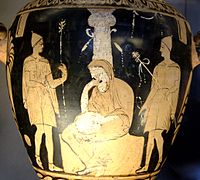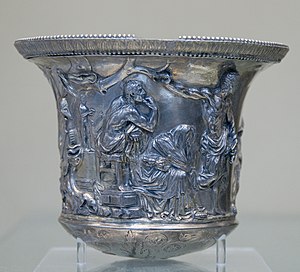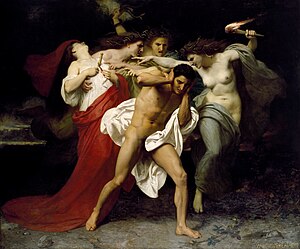Orestes

In Greek mythology, Orestes (/ɒˈrɛstiːz/; Greek: Ὀρέστης [oréstɛːs]) was the son of Clytemnestra and Agamemnon. He is the subject of several Ancient Greek plays and of various myths connected with his madness and purification, which retain obscure threads of much older ones.[1]
Etymology[]
The Greek name Ὀρέστης, having become "Orestēs" in Latin and its descendants, is derived from Greek ὄρος (óros, “mountain”) and ἵστημι (hístēmi, “to stand”), and so can be thought to have the meaning "stands on a mountain".
Greek literature[]
Homer[]
In the Homeric telling of the story,[2] Orestes is a member of the doomed house of Atreus, which is descended from Tantalus and Niobe. He is absent from Mycenae when his father, Agamemnon, returns from the Trojan War with the Trojan princess Cassandra as his concubine, and thus not present for Agamemnon's murder by Aegisthus, the lover of his wife, Clytemnestra. Seven years later, Orestes returns from Athens and avenges his father's death by slaying both Aegisthus and his own mother Clytemnestra.[3]
In the Odyssey, Orestes is held up as a favorable example to Telemachus, whose mother Penelope is plagued by suitors.[4]

Pindar[]
According to Pindar, the young Orestes was saved by his nurse Arsinoe (Laodamia) or his sister Electra, who conveyed him out of the country when Clytemnestra wished to kill him.
In the familiar theme of the hero's early eclipse and exile, he escaped to Phanote on Mount Parnassus, where King Strophius took charge of him.
In his twentieth year, he was urged by Electra to return home and avenge his father's death. He returned home along with his friend Pylades, Strophius's son.
Sophocles and Euripides[]
The same myth is told differently by Sophocles and Euripides in their Electra plays.[5]

Greek drama[]
The story of Orestes was the subject of the Oresteia of Aeschylus (Agamemnon, Choephori, Eumenides), of the Electra of Sophocles, and of the Electra, Iphigeneia in Tauris, Iphigenia at Aulis and Orestes, all of Euripides.
Aeschylus[]
In Aeschylus's Eumenides, Orestes goes mad after the deed and is pursued by the Erinyes, whose duty it is to punish any violation of the ties of family piety. He takes refuge in the temple at Delphi; but, even though Apollo had ordered him to do the deed, he is powerless to protect Orestes from the consequences. At last Athena receives him on the Acropolis of Athens and arranges a formal trial of the case before twelve judges, including herself. The Erinyes demand their victim; he pleads the orders of Apollo. Athena votes last announcing that she is for acquittal; then the votes are counted and the result is a tie, resulting in an acquittal according to the rules previously stipulated by Athena. The Erinyes are propitiated by a new ritual, in which they are worshipped as "Semnai Theai", "Venerable Goddesses", and Orestes dedicates an altar to Athena Areia.

Euripides[]
As Aeschylus tells it, the punishment ended there, but according to Euripides, in order to escape the persecutions of the Erinyes, Orestes was ordered by Apollo to go to Tauris, carry off the statue of Artemis which had fallen from heaven, and to bring it to Athens. He went to Tauris with Pylades, and the pair were at once imprisoned by the people, among whom the custom was to sacrifice all Greek strangers to Artemis. The priestess of Artemis, whose duty it was to perform the sacrifice, was Orestes' sister Iphigenia. She offered to release him if he would carry home a letter from her to Greece; he refused to go, but bids Pylades to take the letter while he stays to be slain. After a conflict of mutual affection, Pylades at last yielded, but the letter brought about the recognition of brother and sister, and all three escaped together, carrying with them the image of Artemis.
Other literature and media[]
After his return to Greece, Orestes took possession of his father's kingdom of Mycenae (killing Aegisthus' son, Alete) to which were added Argos and Laconia. He was said to have died of a snakebite in Arcadia. His body was conveyed to Sparta for burial (where he was the object of a cult) or, according to a Roman legend, to Aricia, when it was removed to Rome (Servius on Aeneid, ii. 116).

Before the Trojan War, Orestes was to marry his cousin Hermione, daughter of Menelaus and Helen. Things soon changed after Orestes committed matricide: Menelaus then gave his daughter to Neoptolemus, son of Achilles and Deidamia. According to Euripides' play Andromache, Orestes slew Neoptolemus just outside a temple and took off with Hermione. He seized Argos and Arcadia after their thrones had become vacant, becoming ruler of all the Peloponnesus. His son by Hermione, Tisamenus, became ruler after him but was eventually killed by the Heracleidae.
There is extant a Latin epic poem, consisting of about 1000 hexameters, called Orestes Tragoedia, which has been ascribed to Dracontius of Carthage.

Orestes appears also to be a dramatic prototype for all persons whose crime is mitigated by extenuating circumstances. These legends belong to an age when higher ideas of law and of social duty were being established; the implacable blood-feud of primitive society gives place to a fair trial, and in Athens, when the votes of the judges are evenly divided, mercy prevails.
In one version of the story of Telephus, the infant Orestes was kidnapped by King Telephus, who used him as leverage in his demand that Achilles heal him.
According to some sources, Orestes fathered Penthilus by his half-sister, Erigone.
In The History by Herodotus, the Oracle of Delphi foretold that the Spartans could not defeat the Tegeans until they moved the bones of Orestes to Sparta. Lichas discovered the body, which measured 7 cubits long (around 10 feet, or 3.30 meters). Thus Orestes would have been a Giant.
For modern treatments see the Oresteia in the arts and popular culture.
Orestes and Pylades[]


The relationship between Orestes and Pylades has been presented by some authors of the Roman era (not by classic Greek tragedians) as romantic or homoerotic. A dialogue entitled Erotes ("Affairs of the Heart") and attributed to Lucian compares the merits and advantages of heterosexuality and homoeroticism, and Orestes and Pylades are presented as the principal representatives of homoerotic friendship:
Taking the love god as the mediator of their emotions for each other, they sailed together as it were on the same vessel of life...nor did they restrict their affectionate friendship to the limits of Hellas....as soon as they set foot on the land of the Tauride, the Fury of matricides was there to welcome the strangers, and, when the natives stood around them, the one was struck to the ground by his usual madness and lay there, but Pylades "did wipe away the foam and tend his frame and shelter him with a fine well-woven robe," thus showing the feelings not merely of a lover, but also of a father. But when it had been decided that, while one remained to be killed, the other should depart for Mycenae to bear a letter, each wished to remain for the sake of the other, considering that he himself lived in the survival of his friend. But Orestes refused to take the letter, claiming Pylades was the fitter person to do so, and thus showed himself almost to be the lover rather than the beloved.
- (47)
In 1734, George Frederic Handel's opera Oreste (based on Giangualberto Barlocci's Roman libretto of 1723), was premiered in London's Covent Garden.
Sanctuary of Maniae[]
Pausanias write that at the road from Megalopolis to Messene there was a sanctuary of goddesses Maniae (meaning madness). Citizens said that it was there that madness overtook Orestes.[6]
References[]
- This article incorporates text from a publication now in the public domain: Chisholm, Hugh, ed. (1911). "Orestes". Encyclopædia Britannica. 12 (11th ed.). Cambridge University Press. pp. 253–254.
External links[]
 Media related to Orestes at Wikimedia Commons
Media related to Orestes at Wikimedia Commons
- Kings of Argos
- Kings of Mycenae
- Kings in Greek mythology
- Greek mythological heroes
- Characters in Greek mythology
- Ancient Greeks accused of sacrilege
- LGBT themes in Greek mythology
- Matricides
- Children of Agamemnon


